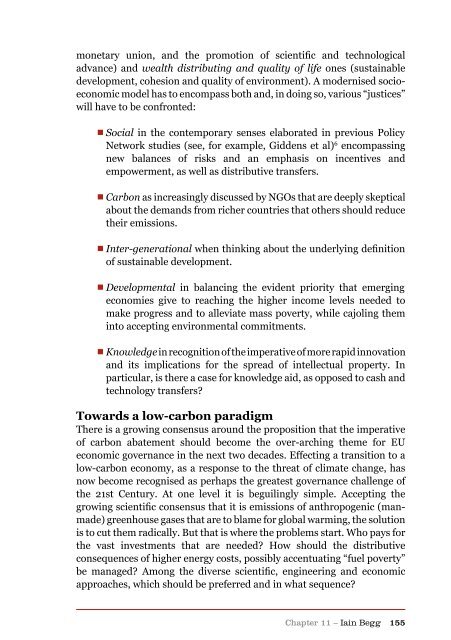Authors Iain Begg | Gabriel Glöckler | Anke Hassel ... - The Europaeum
Authors Iain Begg | Gabriel Glöckler | Anke Hassel ... - The Europaeum
Authors Iain Begg | Gabriel Glöckler | Anke Hassel ... - The Europaeum
You also want an ePaper? Increase the reach of your titles
YUMPU automatically turns print PDFs into web optimized ePapers that Google loves.
monetary union, and the promotion of scientific and technological<br />
advance) and wealth distributing and quality of life ones (sustainable<br />
development, cohesion and quality of environment). A modernised socioeconomic<br />
model has to encompass both and, in doing so, various “justices”<br />
will have to be confronted:<br />
n Social in the contemporary senses elaborated in previous Policy<br />
Network studies (see, for example, Giddens et al) 6 encompassing<br />
new balances of risks and an emphasis on incentives and<br />
empowerment, as well as distributive transfers.<br />
n Carbon as increasingly discussed by NGOs that are deeply skeptical<br />
about the demands from richer countries that others should reduce<br />
their emissions.<br />
n Inter-generational when thinking about the underlying definition<br />
of sustainable development.<br />
n Developmental in balancing the evident priority that emerging<br />
economies give to reaching the higher income levels needed to<br />
make progress and to alleviate mass poverty, while cajoling them<br />
into accepting environmental commitments.<br />
n Knowledge in recognition of the imperative of more rapid innovation<br />
and its implications for the spread of intellectual property. In<br />
particular, is there a case for knowledge aid, as opposed to cash and<br />
technology transfers?<br />
Towards a low-carbon paradigm<br />
<strong>The</strong>re is a growing consensus around the proposition that the imperative<br />
of carbon abatement should become the over-arching theme for EU<br />
economic governance in the next two decades. Effecting a transition to a<br />
low-carbon economy, as a response to the threat of climate change, has<br />
now become recognised as perhaps the greatest governance challenge of<br />
the 21st Century. At one level it is beguilingly simple. Accepting the<br />
growing scientific consensus that it is emissions of anthropogenic (manmade)<br />
greenhouse gases that are to blame for global warming, the solution<br />
is to cut them radically. But that is where the problems start. Who pays for<br />
the vast investments that are needed? How should the distributive<br />
consequences of higher energy costs, possibly accentuating “fuel poverty”<br />
be managed? Among the diverse scientific, engineering and economic<br />
approaches, which should be preferred and in what sequence?<br />
Chapter 11 – <strong>Iain</strong> <strong>Begg</strong> 155

















